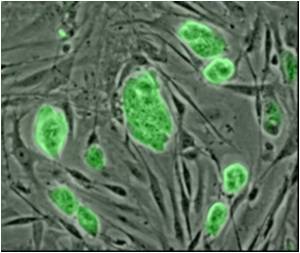T helper-type 1 (Th1) cells, previously thought to mediate autoimmunity, may actual inhibit the development of experimental immune encephalomyelitis (EAE)

MS is believed to be an autoimmune disorder, where damage to the nervous system is caused by the patient's own immune system. Th1 cells, which secrete high levels of the inflammatory mediator interferon-γ(IFN-γ), have been previously implicated as being pathogenic in autoimmune diseases such as MS. More recent data, however, suggests that antigen-specific T cells that produce the molecule IL-17 (Th17 cells) initiate the inflammatory process in EAE.
As IFN-γ suppresses Th17 cell development, a group led by Dr. Nathan Karin at the Rappaport Family Institute for Research in the Medical Sciences hypothesized that IFN-γ-expressing T cells may serve as regulatory cells to block the development of autoimmunity. They discovered that EAE development depended on the death of these antigen-specific IFN-γ-expressing regulatory cells at early stages of disease and that inhibiting the killing of these cells at early stages of EAE suppressed disease development. In addition, overexpression of IFN-γ in EAE-mediating T cells caused them to act instead as antigen-specific regulatory cells. Thus, early suppression of Th17 cells may block the development of autoimmunity.
Wildbaum et al conclude that "recent data from humans suggest that Th17 cells play an important role in the pathogenesis of a diverse group of immune-mediated diseases, including psoriasis, rheumatoid arthritis, multiple sclerosis, and inflammatory bowel disease, and that in these diseases Th17 cells are likely to be the driver cells even at advanced stages. This makes the challenge of understanding the regulatory mechanisms underlying Th17 function highly applicable, even at advanced stages of these diseases."
Dr. Karin states that "the vast majority of multiple sclerosis patients develop a form of diseases know as relapsing-remitting disease, or relapsing-progressive disease, in which attacks are followed by remissions. It is believed that regulatory cells play a major role in restraining the progression of disease." In future studies, Dr. Karin's group will "explore the hypothesis that these new types of regulatory cells indeed participate in the regulation of multiple sclerosis, and if so, determine the mechanistic basis of their entry to program cell death just before the disease accelerates. In particular, [they will attempt to define] what makes these regulatory cells more susceptible to entering the process of programmed cell death compared with other cell types? This may lead to the development of novel ways to treat multiple sclerosis and other inflammatory autoimmune diseases."
Advertisement
RAS








